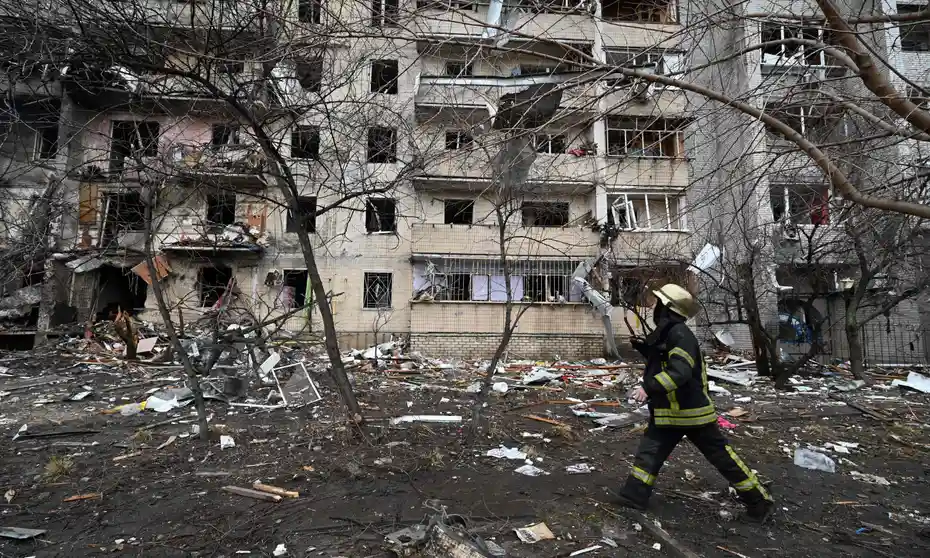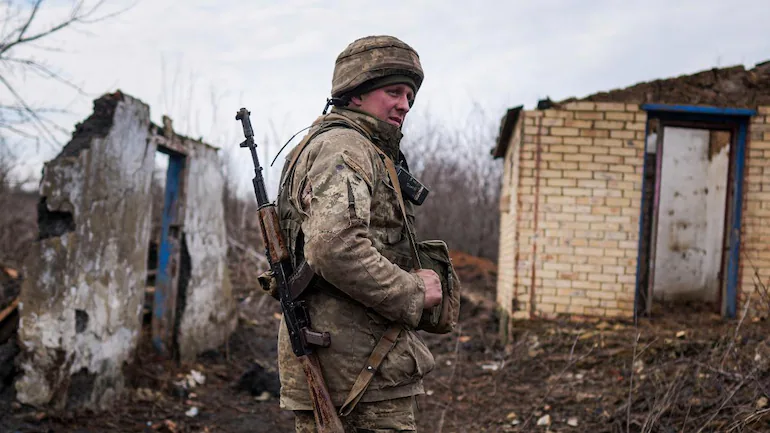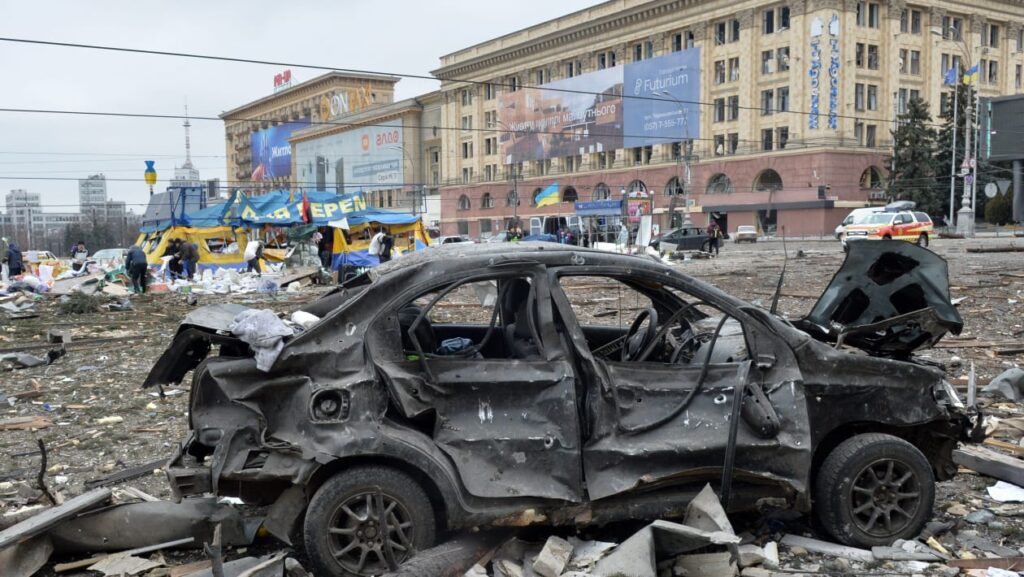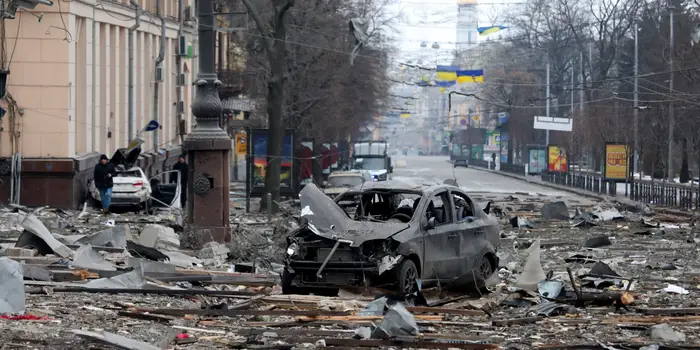It’s hard to talk about traveling when there is death, bombs, refugees… war in the heart of Europe today. The Travel and History blog was created to promote conscience travel and share interpretations of life. In this post I am attempting to put thoughts together, analyze and spell them out for myself. Yes, for myself, how do I, a Russian citizen living in the USA, understand this conflict.
First and foremost- war is horrible, nothing can justify it. Let’s compare how two sides see it.
The Russian rationale
To my great surprise some Russians who, if not actively supporting the war, are justifying it and sympathizing with the propagated from state ran TV government agenda. So to understand one side I decided to watch these news myself. The official Russian position set following goals, advocating the conflict: de-nazification, defense of people in Donbass, and demilitarization of Ukraine.
For example this is how Mr. Lavrov (Russian diplomat and minister of Foreign Affairs) explains the casualties – war is destructive affair, but there is so called “collateral damage” associated with any military conflict. He adds that the recent history of NATO involvements such as destruction of Iraq or bombing Kosovo had collateral damage as well, but the West preferred not to see it.
The Russian leadership sees expansion of NATO members in the past decades threatening and claims that Ukrainian membership in the “club” can jeopardize the existence of the country.
As a Russian, I do have concerns about military alliance and missile installations close to Russian borders. I’ve read and watched about Ukrainian far-right organizations. I am well aware of western interests in Middle Eastern oil.
But there is nothing that can justify war in Ukraine. How one can rationalize death in the name of safety? Only “ran out of argument” bullies resolve the conflicts with brawl. Killing people, causing chaos and annihilating infrastructure is this how modern Russian government manages regional conflicts today?

Let’s take a look at history and review Lavrov’s points.
War in Kosovo in 1998. Some Russians hail to Slobodan Milosevic’s (former president of Serbia, who was standing a trial for war crimes and crimes against humanity in International Criminal Tribunal for the Former Yugoslavia) leadership and curse NATO bombardments. The dissolution of former Yugoslavia indeed was bloody. The regional Balkan conflicts turned into full fledge war with atrocities on all sides including NATO as well.
The UN Security Consul disapproved the [NATO] military intervention, but wasn’t able to do anything about it. Wikipedia explains it as “NATO’s intervention was prompted by Yugoslavia’s bloodshed and ethnic cleansing of Albanians, which drove the Albanians into neighboring countries and had the potential to destabilize the region”.
It is evident that the organization had not so glorious part in the conflict. NATO wanted to contain Mr Milosevic’s authoritarian ambitions. Still this is not a good enough reason to launch bombs. Yes, Milosevic was a dictator with bloody hands, yes, there were different interests in the conflict, but European allies could have resorted to more peaceful measures.
War in Iraq is a well studied subject in the United States. It’s evident now that under fictional pretense the US had started the invasion. And again we see death, archaic basement hospitals and doctors heroically saving lives. To the day the country is still dealing with aftermath of the US invasion. Iraq’s infrastructure today is worse than it was in 1990(!), people still don’t have access to clean drinking water, power stations are still recovering from bombardments.
Not mentioning that it became a breeding nest for ISIS fighters only years ago. Western imposed 12 year economic embargo on Iraq (which the US intentionally didn’t want to remove) contributed to a dramatic increase in child deaths. It is not a secret that Mr. Hussein was a dictator, but there was a lot of western interest in oil business as well. Again what are the results of the conflicts: the use of chemical weapon, the two Persian Gulf wars, more death, tears, blood, and despair. What future Iraq has now?
“For me what is tragic, in addition to the tragedy of Iraq itself, is the fact that the United Nations Security Council member states … are maintaining a program of economic sanctions deliberately, knowingly killing thousands of Iraqis each month. And that definition fits genocide,”
Denis Halliday, a U.N. humanitarian coordinator of the Oil-for-Food program
I am not intending to vilify European communities, see the events in black and white colors, or perceive people/organizations as good or bad natured. I am only pointing out that we live in complex world, where colors rather mixed.

The Western perspective
Compare to the annexation of Crimea in 2014 (precursor of today’s war in Ukraine) this time Western leaders are united in their response to Russian menace. Let’s review the viability of Russian claims in the conflict. What is the term “de-nazification“? The Merriam Webster dictionary puts it as “to rid of Nazism and its influence”. Just like Americans were bringing “democracy” to Middle East, Russia tries to “denazify” Ukraine today. Sounds ludicrous? Well the Kremlin doesn’t think so, let’s take a closer look.
Ukrainians infamously get a bad reputation as Nazi sympathizers. It’s true that there are far-right organizations such as Svoboda, Right Sector, and Azov Battalion. Indeed the country has existing problems with white supremacy groups, whose leaders becoming legitimate political figures.
Since Maidan Revolution in 2014 the activity and support for far-right have only intensified. The detailed information can be further found in “Neo-Nazis and the Far Right Are On the March in Ukraine” article from the Nation. Now knowing this issue, let’s not forget that in 2019 at the Parliamentary election none of the above mentioned groups gained enough support to be represented in the legislation branch. So there is no Nazis in Ukrainian leadership and if there were it’s minute.

What about the People of Donbass? “Where was the western attention the past 8 years in the conflict in Eastern Ukraine?” A popular question in Russia today? The statistics, such as number of ethnic Russians living in Ukraine, the popularity of pro Kremlin policies in some regions, the history of the country itself, evidently show the division on two camps – pro-Russian East and pro-European West.
Speaking about Donbass and Luhansk conflicts readers should clearly understand that these cities are part of Ukraine, people who live there are Ukrainians.There are a lot of ethnic Russians in these regions that’s understandable. Some of them sympathize with Russia, that’s possible. Russian military intervention in the Ukrainian’s internal affairs, that’s illegal. By meddling (under whatever pretext) Russia violated international laws, dishonored shared Slavic history, and caused huge historical trauma between two nations that may never heal from their wounds. Dictators come and go, but it’s people who make history.
What does demilitarization mean? I wish I knew the answer. The Merriam Webster dictionary explains it as “to do away with the military organization”. Does it mean destroying all military personnel? Or attacking military bases? Maybe killing everyone who can bear arms? What are the goals of the demilitarization? Does Ukraine look like military bully and threat for its neighbors? These questions are futile. Looking at the top 10 military spending chart in 2022 according to World population review website I see Russia on 4th place and can’t find Ukraine. Demilitarization is clearly made up story.
- The United States ($778 billion)
- China ($252 billion [estimated])
- India ($72.9 billion)
- Russia ($61.7 billion)
- United Kingdom ($59.2 billion)
- Saudi Arabia ($57.5 billion [estimated])
- Germany ($52.8 billion)
- France ($52.7 billion)
- Japan ($49.1 billion)
- South Korea ($45.7 billion)

The historic outlook
Europe has been a hot bed of regional conflicts for years. The wars were started under different pretexts: racial supremacy, economic domination, terrorist threats. The military resolution is nothing new in the history. Ukraine, like Poland or Kurdistan for that matter, had been the victim of imperial ambitions for centuries. No one can deny that war is disgusting mess! Nothing can rationalize blood spilling, death, violence. We live in modern world of 21st century, people should be more careful with decisions.
The place where conflicts are resolvable by brute force should be thing of the past, belonging to history books. It’s evident that international organizations don’t always objectively interpret events. Also there is a significant propaganda agendas on all sides. Read my article Propaganda to learn more. We should strive for diplomacy, nuclear disarmament, emphasize on shared values.
Catherine the Great once said “the victors don’t have to justify themselves” (or in other words “the victors are not judged”). In 1783 she singed a manifesto, acquiring Crimea to the Russian Empire. Today we see the conflict smoldering once again. Initiators of war in Ukraine should be judged, Russia should pay reparations, and Crimea, Donbass and Luhansk should be returned to Ukraine.

